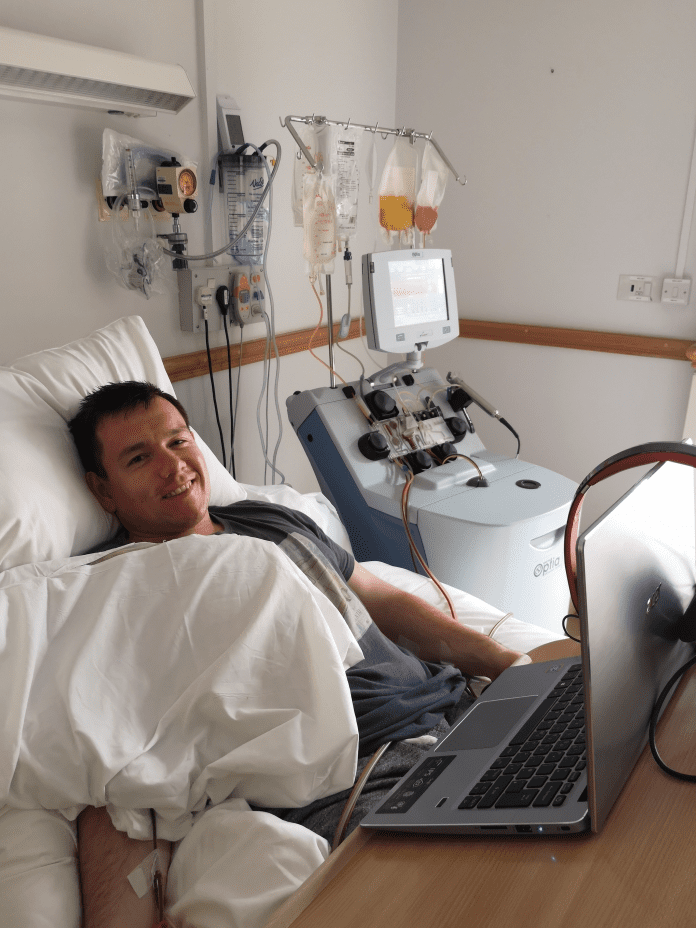A Carmarthen police officer has described the honour of potentially saving the life of a person fighting a rare form of cancer as he encourages others to sign up to the bone marrow register.
When Dyfed-Powys Police PC Kieran Morris went through the stem cell donation procedure, he gave a blood cancer patient a vital chance of survival.
As he shares his experience with the aim of encouraging others to sign up to the Welsh Bone Marrow Register, he says the hope his donation would have given a family far outweighs the discomfort of the procedure.
Looking back, PC Morris said: “I’d been thinking about signing up to the bone marrow register since turning 18, although I wasn’t sure if there were any risks involved and I therefore put it off.
“I give blood every three months, and when the Welsh Blood Service was in my local village, I asked them some more questions about it. After finding out that there were no long term risks associated with donation, I decided to register myself.”
The Welsh Bone Marrow Register is a panel of blood donors who have volunteered to be bone marrow or peripheral blood stem cell donors. The register is scanned every day to find donors who match patients in need of a life-saving donation.
For two years after signing up, PC Morris didn’t hear anything. Then at the end of 2019, he received a phone call with news that he could change someone’s life completely.
He had been matched with someone fighting a rare form of blood cancer, and that a peripheral blood stem cell donation was vital in giving them a chance of surviving.
“I felt honoured,” he said. “I felt that I had a chance to possibly improve someone’s life, or even save someone’s life.
“The feeling of hope that the person may have felt when finding out that they had been matched must have been massive, so for that, I felt that I may have made a difference to that person’s life.”
PC Morris was one of five people matched with the patient, and was asked to give a blood sample in order to determine his exact level of compatibility.
Two months prior to the donation, he was told he was the most suited candidate to donate.
Before the procedure began, he had a counselling session at the Welsh Blood Service headquarters, and underwent a full medical test.
Once the match was confirmed, and he was declared fit, the procedure began at home. For five days, a nurse visited PC Morris to inject him with medication which allowed his body to produce extra stem cells.
“The medication affects people differently, but for me it caused some back pain,” he said.
On the fifth day, he visited a hospital in Newport for the procedure to take place. With the appointment taking place during the COVID-19 pandemic, PC Morris not only faced the stem cell extraction procedure, but the additional precautions in place to reduce the spread of the virus.
“It was very quiet,” he said. “It was at the start of the lockdown and seemed odd, though necessary, particularly as we were up in Newport, where cases have been high.
“I was the only person at the ward and all the staff had to wear gowns, masks and gloves. I was also tested for Covid-19 while at the hospital and given a questionnaire regarding my health and any symptoms I was displaying.”
The PC then underwent peripheral stem cell collection at the hospital, which took around seven hours.
“You have a choice of a procedure under general anaesthetic which involves an operation-style extraction of stem cells, or peripheral stem cell collection,” he explained.
“I opted for the peripheral stem cell collection as I was informed that it was the best type for the person that needed the donation.
“It involves a cannula in each arm, with one taking your blood and transporting it in to a machine, which separates your stem cells from your blood.
“The blood without the stem cells is then put back in to your body through the other cannula.”
He was allowed home the same day, and said the only side effect was tiredness and lethargy, which lasted around a fortnight.
Although most people are only chosen to donate blood stem cells once, PC Morris will remain on the Welsh Bone Marrow register in case he is matched with another person. If he is, he would then be taken off the register as one person can only donate twice.
Despite the discomfort, PC Morris is encouraging people to think of the difference they could make to someone’s life by signing up to the register.
“The cost to you would massively outweigh the benefits to the person needing the donation,” he said.
“I experienced back pain, which I knew I would recover from and it was only for a couple of days, whereas the donation could save the person’s life.
“It is not guaranteed that the person receiving the donation will recover from the cancer, though the hope that they and their sons and daughters and wider family would have felt just believing that they have a chance, would have been incredible.”
To find out more about bone marrow and stem cell donation, visit https://www.welsh-blood.org.uk/giving-blood/bone-marrow-donor-registry/
Help keep news FREE for our readers
Supporting your local community newspaper/online news outlet is crucial now more than ever. If you believe in independent journalism, then consider making a valuable contribution by making a one-time or monthly donation. We operate in rural areas where providing unbiased news can be challenging. Read More About Supporting The West Wales Chronicle


























